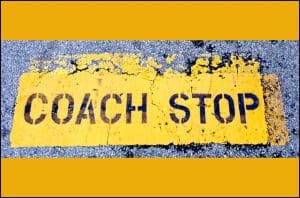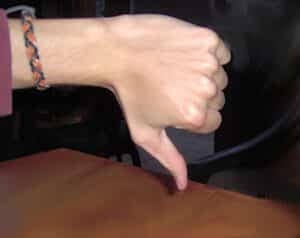Beware the Coax Coach | Childhood Obesity News

July 4 and many other holidays share common traits, such as being the occasion of much overconsumption of not only food but other substances that encourage people to drop their inhibitions and do foolish things, like eat until the cows come home.
That ancient colloquialism has deep significance, implying both duration and inevitability. First, cows don’t come home until it is dark, and sometimes not even then. Second, the cows will eventually return home. The point being, holiday celebrations give a lot of people the opportunity to disappoint themselves once again, be shamed by family members and alleged friends, and make promises they will be unable to keep.
Sure, we get off on the neurochemical effects of carbs and fats, but something else is going on at these times, as we become particularly susceptible to this formulation:
Emotional eating is always symbolic eating and among the chief architects of compulsive and binge eating.
To a vulnerable individual, a cake might as well be cocaine. Billi Gordon, Ph.D., had a lot of insights about the particular type of binge eating that occurs during holidays, and even more to say about how people unwittingly aid and abet the harmful behavior.
This is a very flexible talent that allows humans to convince both ourselves and others that, just because some decorations are hanging from the walls, it is perfectly okay to do things that are not good for us. But we can’t help it. Our brains reliably connect symbols with ideas, so when we see festive holiday paraphernalia, the rational mind is no longer in control.
As if things were not bad enough already, Dr. Gordon observed that compulsive eaters are also more prone than some other types of people to experience inappropriate reactions, read social cues inaccurately, misinterpret interpersonal situations, and so forth. It gets worse. There are multiple layers of meaning, with the potential to grow progressively darker. Speaking from personal experience, Dr. Gordon wrote in Psychology Today,
Some badly abused children use chewing and compulsive eating to symbolically destroy the mother, while other abuse survivors use chewing and compulsive eating as a symbolic replacement for maternal love.
Gordon holds that basically everybody is capable of eating to drown and bury feelings. It’s part of our basic equipment. The behavior is potentially in everyone’s repertoire, even if they rarely feel the inclination. Some people manage to sail through life without ever becoming enmeshed in that particular trap.
Other lucky people only respond on rare occasions to the symbolic and emotional lure of eating. A compulsive overeater is one who employs the mechanism far too often, because their emotional center is burdened with far too many cues, both external and internal, that they are unable to either ignore or overcome.
The traps
It is very difficult to resist family members and other close people who urge us to eat more. They do it on their own behalf, as in, “What’s wrong, I didn’t whip the potatoes soft enough for you?” They need to score some kind of point off you, because of their own emotional difficulties. Or, they do it by proxy, as in, “Take some gravy. Don’t hurt your mother’s feelings.” A family gathering is an ideal time for fakers and posers to try and impress the crowd with how much they care.
But even fakers and posers are relatively easy to overcome when compared to coaxers. This individual purports to not care about their own feelings or other people’s feelings. No, no — the coax coach is all about you. “Oh just have one little bite, it won’t hurt you.” They wheedle and tempt and cajole as if they have some personal stake in fattening you up like some kind of sacrificial lamb. Who knows what twisted motives impel people to tempt sober alcoholics and faithful spouses and people who really simply do not want or need “just one little bite.”
The takeaway
The best holiday advice is, “Drive responsibly.”
The next most important holiday advice is, “Don’t listen to a coax coach.”
And for goodness’ sake, please don’t be one.
Your responses and feedback are welcome!
Source: “Christmas Cookie Blue,” PsychologyToday.com, 12/06/13
Source: “Symbolic Eating,” PsychologyToday.com, 11/23/13
Image by Johan Lange/ATTRIBUTION 2.0 GENERIC








